CONSERVATION CORNER
A weekly blog for all things conservation
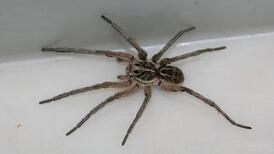 Kevin Brown, Ag Resource Specialist, BCCD Yes, I am one in the large masses of people who hate spiders. I saw a movie as a youngster, called Tarantulas (I believe), and ever since then I have hated them with a passion. They are ugly, creepy, and are always looking to bite you, right? Wrong. Well, they may be ugly (in the eye of the beholder), but they aren’t out just willy-nilly looking to lay one into you. Like most animals, they don’t want to be any closer to you than you want to be to them. Actually, if you do a bit of reading, spiders are very beneficial creatures. In leading up to this article, I did some quick research and with the exception of the black widow, brown recluse and the yellow sac spider (phys.org article on “Spiders Are the Most Effective Predators”), all the rest are quite harmless.
0 Comments
Kevin Brown. Ag Resource Specialist, BCCD
I have probably written about this before, but I just see too much of it going on right now to not write about it again. As I drive around the county and try to pay attention to what is going on out there on the landscape, I notice that there are a TON of people that have cattle that have them out there grazing their lands already. Most, from what I can tell, have almost their entire pasture opened up to them. If you don’t really understand pasture and hay growth, this may make sense to you. It is growing slowly at this point, and there is so little of it, that you need to give them as much room to roam as you can for them to find enough to eat. While that may seem to be common sense, it is exactly the opposite of what you should be doing. 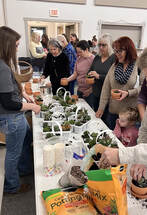 Miranda Neville, Ag. Resource Specialist, BCCD Breanna Ameigh, West Nile Virus Coordinator, BCCD Last week, on April 4th, we hosted our second Women in Agriculture event at Alparon Park in Troy, PA. We had 60 fellow women in agriculture, along with some sweet, little future Women in Ag. We wanted to provide an opportunity for women in surrounding counties to come together, hear insightful speakers, network with other related businesses, and enjoy a day filled with knowledge, laughter and camaraderie.  Cathy Yeakel, BCCD, District manager Spring is Right Around the Corner Earth Day was first celebrated on April 22, 1970, as an environmental awareness day to educate people about pollution and its effects on the environment. Founded by a U.S. Senator from Wisconsin, Gaylord Nelson, Earth Day became a global movement to protect our environment. Since 1970, celebrations have changed from awareness lectures to outdoor events offering education on our natural resource issues and demonstrations. Kevin Brown, Ag Resource Specialist, BCCD
Solar, we hear a lot about it. We certainly hear the good stuff (in my opinion) because usually someone behind all those good things is trying to sell you something. If you are a regular reader of the article, you know my philosophy on how the world works in that aspect. I will digress at the end of the article on this. For now, you want to know about solar.  Lacy Powers, BCCD, Conservation Technician A new regulation on fish stocking has been in effect since January 1st of 2024 by the Pennsylvania Fish and Boat Commission (PFBC). What is this new regulation and how does it affect you as a pond/lake owner or private citizen? The PFBC is now requiring a Notice of Stocking (NOS) form for any person or group engaging in fish stocking into Commonwealth waters. This regulation allows the PFBC to monitor the species, number, and location of fish that are entering the waters of the Commonwealth, as well as ensure the health and well-being of Commonwealth waters and aquatic life. Pennsylvania is not the first state to take a proactive response to the increasing challenges brought by aquatic invasive species, as 30 other states such as New York, New Jersey, and Maryland monitor fish stocking too. With this new regulation it is important to know exactly what Commonwealth waters are and when you need to submit a NOS form to the PFBC. 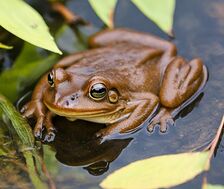 Lacy Powers, BCCD, Conservation Technician The cold chill of the winter months is finally working its way behind us as summer rounds the corner in Bradford County. This is a special time of year as everyone, as animals to plants, start to shake off the winter frost and embrace the birth of the new season. We begin to notice the tips of trees start to turn green and little seedlings make the mighty break through topsoil to bask in the sun. This burst of excitement can be observed around the pond too, as the ice melts and the pond’s inhabitants are finding new life in the warmer days. One such amphibian that is awakened this time of the season is the Spring Peeper. 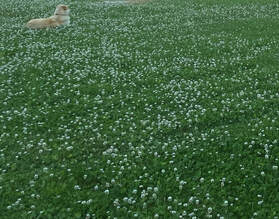 Kevin Brown- BCCD, Ag Resource Specialist One of my favorite sayings- In this day and age, EVERYONE is trying to get into your pocket and get as much money out of it as they possibly can. This pressure has really built up over the last decade or two. As I try to think of examples from “back in the day”, I can only think of one or two that really stick out. However, lately, we get it from every angle. They can come up with anything to get a few more dollars from you. I love music. I was listening to an app on my phone one day and a really good song came on. I thought, “I would like to hear that again” so I hit rewind. A message came on that basically said, “we would love to play this song again for you, but you have to be a subscriber in order to do that. Please click here and for a low, low amount of $5/month and you can rewind every song you want”. Really? I need to be charged to hear a song again? No thanks. 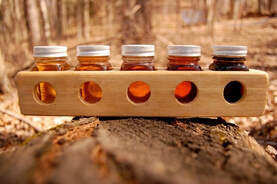 Ryan Reed, A reprint from Forest Fridays, a DCNR publication Across much of the mid-Atlantic and northeastern states, sugaring season is well-underway. Of course, the bell cow for syrup production, the sugar maple, is the species most commonly tapped for this purpose. Maple sugaring seems to be trending upward in recent years (perhaps due to social media attention), but not everyone has a stand of sugar maples with which to work, which has led to some innovation. If you don’t have sugar maples, then why not try something else? A quick review of a few web sources reveals that some folks are indeed trying alternative species, with some interesting results. Some common species used in lieu of the sugar maple are red maple, silver maple, Norway maple, and boxelder (a close maple relative). These species make good options but require quite a bit more effort since their sugar contents are lower.  Artificial Intelligence working with AI Artificial Intelligence working with AI Patrick Cullen, BCCD, District Engineer I tried something different and submitted a prompt to AI (Artificial Intelligence, for us old people who don’t keep up with the latest in technology (Kevin Brown)) to write an article on how it can be utilized in Conservation Efforts. The following is the response. Important disclaimer: This content was generated by artificial intelligence. It may contain errors or inaccuracies and should not be relied upon as a substitute for professional advice. AI: Hello human, I am a GPT powered AI chat bot. Ask me anything! You: Write a 400-word article on how AI can help with conservation efforts. |
AuthorsVarious staff at the Bradford County Conservation District Archives
April 2024
Categories
All
|
